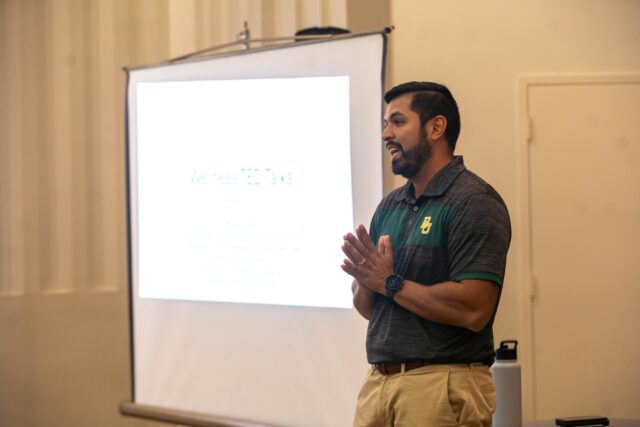By Ava Schwab | Reporter
Students filed into Recital Hall II on Monday afternoon, notebooks and instruments in hand. The School of Music’s Health and Wellness Initiative turned the space into a mini TED-style stage for short talks on wellness.
The event, titled “TED Talks: Baylor Wellness Resources,” counted toward the School of Music’s semester wellness-credit requirement. Faculty organizers said the series aims to link physical and mental well-being with sustainable skill.
Dr. Lesley McAllister, professor of piano and coordinator of piano pedagogy, began the meeting, recognizing it as both the first of its kind and also an introduction to another event later in the week, “Baylor TED Talks,” scheduled for Saturday.
José Vallejo, assistant director at the Beauchamp Addiction and Recovery Center, opened the session by describing the peer-led approach the center takes to support students in recovery. The BARC hosts five weekly support groups, each led by students who have experienced recovery themselves.
“The opposite of addiction is connection,” Vallejo said. “We’re building spaces where students can walk together through recovery.”
Vallejo explained the center also assists students affected by a friend or family member’s substance use, as well as those who want to serve as recovery allies.
“Our goal is to create a community where every student can learn healthy ways to live out wellness,” Vallejo said.
The program also featured a recorded presentation by Marjorie Wilkin, a doctoral student in occupational therapy at Baylor. Wilkin’s talk focused on practice-related musculoskeletal disorders, or PRMDs, which are injuries caused by repetition, posture and overuse. These, she said, can affect up to 90% of musicians during their careers.
“Early awareness and posture are key,” Wilkin said in the video. “Even simple warm-ups, stretching routines and adaptive equipment can prevent long-term strain.”
Dr. Michael Scullin, professor of psychology and neuroscience, followed the video with a discussion on the science of sleep. His research examines how consistent rest improves learning, mood and performance. Scullin illustrated this message with his own “eight-hour sleep challenge,” a classroom experiment that encourages students to prioritize rest during finals week.
“If sleep did not serve an absolutely vital function, that would be the biggest mistake in the evolutionary process,” Scullin said. “Sleep is not a mistake — it’s a biological necessity.”
Scullin said students who take his challenge reported better feelings and academic performance.
“Once you experience what good sleep feels like, you don’t want to go back,” Scullin said.
Representatives from Baylor’s Counseling Center and Health and Wellness Office shared information about mental health and nutritional support. Counselor Dylan Kirby explained both the accessibility of appointments and how important the care is for students.
“Four years is a long time to never have anything come up that you might want to talk about,” Kirby said.
Regina Mastin, registered dietitian with the Counseling Center, discussed nutrition as a key part of performance and focus. She highlighted multiple services available to students, including peer nutrition advisors, dining hall dietitians and online sessions.
“Sleep and food go together,” Mastin said. “Those are usually the first things students give up — and they’re the ones that keep you running.”
The program closed with remarks from Student Wellness Ambassadors, who organize helpful resources for students, including informal spaces for students to decompress and weekly chats in the building.
As the first wellness-focused TED-style presentation ended, the afternoon’s message was clear: the art of performing begins with taking care of the performer.




